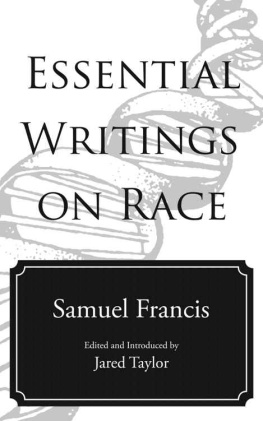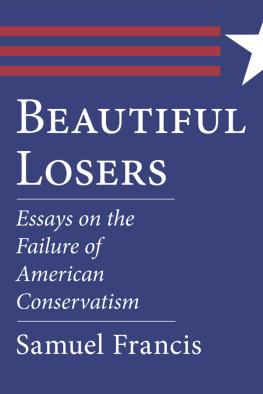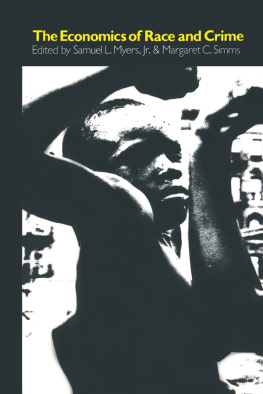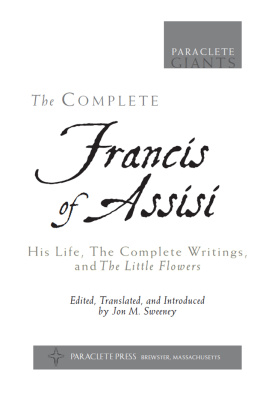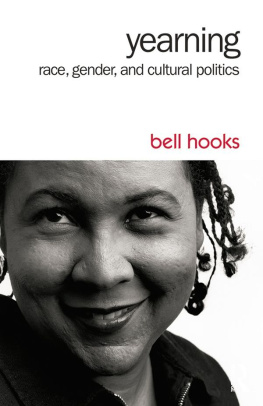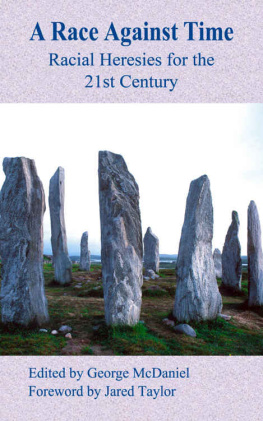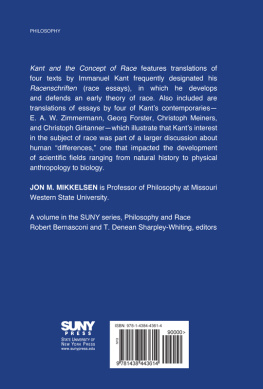Essential Writings
on Race
SAMUEL FRANCIS
Edited and Introduced by
JARED TAYLOR
New Century Foundation
Other titles from New Century Books:
Jared Taylor, Ed., The Real American Dilemma: Race, Immigration, and the Future of America, 1998
George McDaniel, Ed., A Race Against Time: Racial Heresies for the 21st Century, 2003
Michael Levin, Why Race Matters: Race Differences and What They Mean, 2005
Carleton Putnam, Race and Reason: A Yankee View, 2006
Steven Farron, The Affirmative Action Hoax: Diversity, the Importance of Character, and Other Lies (Second Edition), 2010
Jared Taylor, White Identity: Racial Consciousness in the 21st Century, 2011
Jared Taylor, Paved With Good Intentions: The Failure of Race Relations in Contemporary America (20th Anniversary Kindle Edition, 2014, based on First Carroll & Graf Edition, 1992)
Published daily on the Internet:
American Renaissance
www.amren.com
Copyright 2014 by New Century Foundation
All rights reserved. This book or any portion thereof may not be reproduced or used in any manner whatsoever without the express written permission of the publisher except for the use of brief quotations in a book review.
This Kindle edition is current as of May 22, 2014, and is based on the First New Century Books Edition, Copyright 2007 by New Century Foundation.
Cover design by Kevin I. Slaughter
Kindle edition prepared by John Vawter
Contents
Washington Times
American Renaissance
American Renaissance
American Renaissance
American Renaissance
American Renaissance
American Renaissance
American Renaissance
Social Contract
Occidental Quarterly
Race and the American Prospect
***
Introduction
by Jared Taylor
S amuel Todd Francis wrote brilliantly on a wide range of subjectsterrorism, politics, society, history, the South, literature, theory of elitesbut he will be best known to future generations for what he wrote about the politics of race. He was his generations most incisive theorist on this difficult subject, and he paid a high price for his determination to write the truth as he saw it.
Francis was born on April 29, 1947, and was reared in Chattanooga, Tennessee. He showed great ability as a student, winning citywide prizes for poetry and essays. He went to John Hopkins as an undergraduate and earned a Ph.D. in British history from the University of North Carolina. From 1977 to 1981, he was a specialist on terrorism and security at the Heritage Foundation in Washington, D.C., before joining the staff of Sen. John East, Republican of North Carolina.
When Senator East died in 1986, Francis found his true calling as a journalist and essayist, when he joined the Washington Times as an editorial writer. In both 1989 and 1990, he won the Distinguished Writing Award for Editorial Writing given by the American Society of Newspaper Editors, and in both years, he was a finalist for the Scripps Howard Foundations Walker Stone Prize for editorial writing. He became a staff columnist for the Washington Times, and Creators Syndicate distributed his twice-weekly columns for national syndication.
When Francis began his career at the Times, the rules that govern what may be said and thought about race had already hardened into the rigid orthodoxy that continues today. Francis did not at first break those rules, not because he concealed his views, but because he wrote on other subjects. His opinions evolved, however, in directions that increasingly stretched the boundaries of orthodoxy.
For a few years, Francis seemed to live a charmed life. His national reputation not only made it difficult to fault him for increasingly dissident views, it vastly increased the reach of those views. He thumbed his nose at dogma, writing one merrily subversive column after anotheruntil the ax fell in 1995. The first two selections in this anthology are what finally provoked even the generally tolerant Washington Times to fire him. The circumstances are explained in the prefatory comments to each article.
It was a shock to Francis to lose his job and his livelihood, but he quickly landed on his feet. Friends stepped in with support, and although he lost his most prominent podium, he gained something that enriched us all: the freedom to write entirely as he pleased. He spent the next ten yearsuntil his untimely death at only age 57expanding his understanding of race and the role it plays in American and world events. Except for the two pieces that led to his dismissal, the essays in this collection date from the last decade of his life and reflect his most mature and unfettered writing on the subjects he cared about most.
Although the Washington Times never published Francis again, and many newspapers dropped his column, he had a large, loyal audience and many outlets for his work. He became editor of the Citizens Informer, published by the Council of Conservative Citizens, and book editor of the Occidental Quarterly. He continued as a contributing editor to Chronicles, and also appeared regularly on the Vdare.com website and as a featured essayist in Middle American News. He also wrote for the magazine of which I am editor, American Renaissance, where many of the articles in this collection first appeared.
During those years, Francis was the intellectual leader of a small but growing movement to awaken whites to the crisis they face, to alert them to what is at stake if they fail to defend their legitimate interests as a distinct people with a distinct culture. Francis and I were colleagues in this work, but also close friends. I could claim that privilege for perhaps the last 15 years of his life, and by the time he died there was no onebesides my family and coworkerswith whom I spoke more often.
I have written at length elsewhere about the man behind the body of work that influenced so many readers. (See Sam Francis, American Renaissance, April 2005, and Personal Recollections of Sam Francis, the Occidental Quarterly, Vol. 5, No. 2. Both are available online.) Those who did not know the man, however, may appreciate even a greatly abbreviated sketch.
Francis was famous for good conversation. Like so many brilliant men, he had an omnivorous curiosity and an apparently limitless memory. Although sometimes standoffish with strangers, he could delight his friends late into the night with insights on everything from Plautus to Playboy. There was no one with whom one could spend a more pleasant and instructive evening, and to enjoy his society was to feel oneself in the presence of one of the great minds of our time.
More than anyone I have known, Francis had a vivid sense of the present as a direct extension of the past. Unlike many people, whose Ph.D. is a labor undertaken for professional purposes and then set aside, Sams historical learning reflected a real joy in knowing the past. He could observe his own times from a perspective that was rich with historical lessons and parallels. I believe it was his love of history, his pride in a heritage that stretched back to the Greeks, that gave him so clear a sense of the immense risks his country was running by accepting a view of race he knew was wrong.
Because he was so aware of these risks, Francis became increasingly annoyed with liberals who were blind to those risks, and with self-styled conservatives from whom he expected greater insight and honesty. It irked him to be unable to persuade others of the truth of what seemed obvious, and an aroused Francis could write so bluntly it could startle even his admirers. But that was Sam Francis; in his hands, words were weapons.

